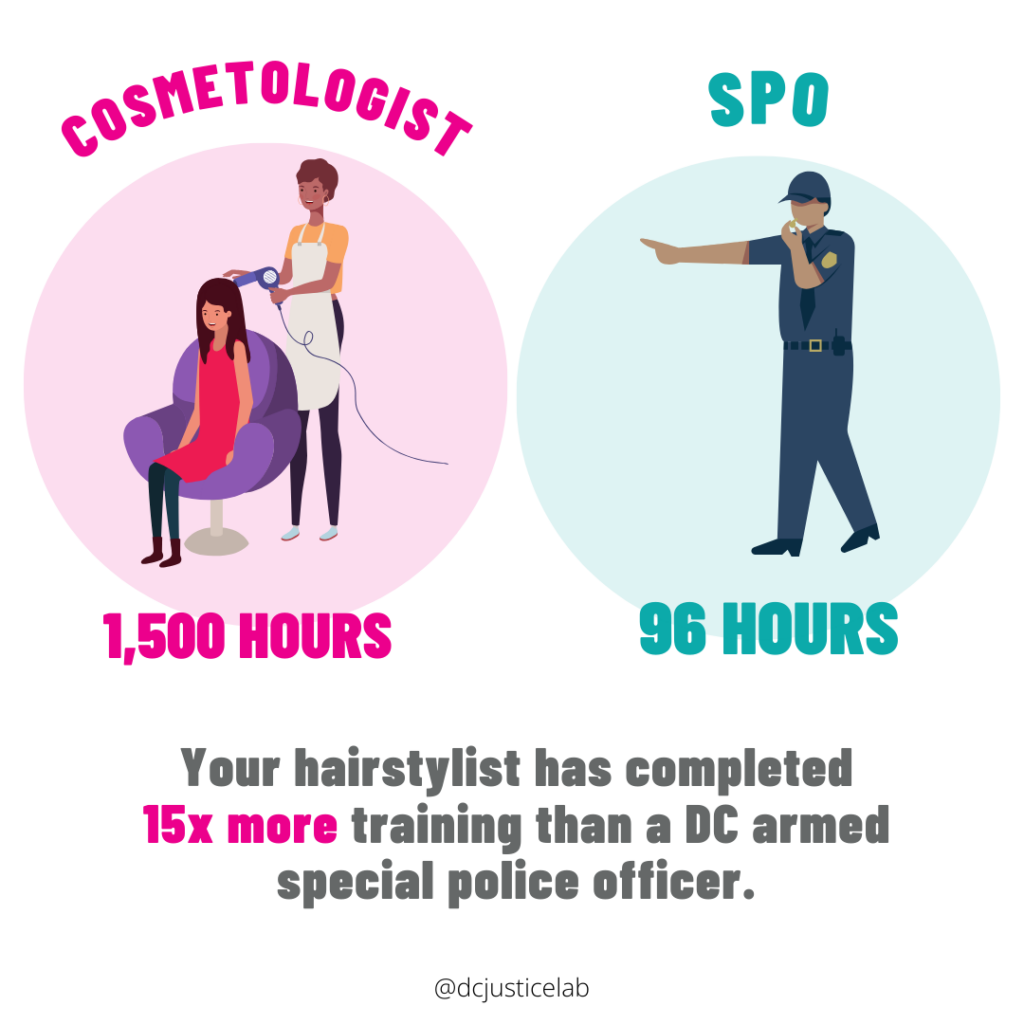special and campus police
Cosmetologists have more specialized training than armed special police officers in DC.
- 5 Minute Read
Along with more than 3,000 Metropolitan Police Officers, there are 7,700 DC special police officers (SPOs) in DC who are privately-hired security guards assigned to guard stores, offices and buildings and university campuses. An armed SPO in DC can receive as little as 96 hours of training. That’s less than three weeks. DC government officials have said there is no reliable system to track hiring, experience, and qualifications of SPOs. People, like Alonzo Smith, have been killed or seriously injured by SPOs. Other places, such as New Jersey, Boston, and North Carolina, require more training and instruction than DC does. While bills in DC have been introduced to increase the training requirements and shift oversight to the District’s Office of Police Complaints, significant legislative action has yet to be taken.

What you need to know
Special and Campus Police Officers receive far less training than the police.
Almost 60 percent of SPOs in DC carry guns. While a private company may provide more to a candidate, the DC Code says that, at a minimum, a Special Police Officer must receive 40 hours of training before starting work. An armed Special Police Officer must receive an additional 56 hours of basic firearms courses. General training and firearms training add up to a total of only 2.5 weeks. MPD officers, by contrast, receive twenty eight weeks of training at the academy. SPO’s have said they do not receive racial, cultural sensitivity, or mental health training. DC lags behind in SPO training: New Jersey requires 11.5 weeks for armed SPOs, and North Carolina requires a 16-week training program and an exam, as well as successful completion of their employing agency’s particular firearms training. Occupations that do not carry a fraction of the risk to public safety require much more training. For example, nail technicians need 150 hours (3.75 weeks), and cosmetologists need 1,500 hours (37.5 weeks).
DC residents have been seriously harmed and put at risk by Special and Campus Police Officers.
SPOs have been accused of brutality, negligence, harassment, and sexual harassment. In 2022, Michael Rowe filed suit against PChange Protective Services and seven SPOs for unlawfully stopping, searching, and assaulting him. Alonzo Smith is not the only person who died after an encounter with untrained SPOs. Special Police Officers were indicted in the death of a 74-year-old patient at the Washington Hospital Center in 2016. This year, a Special Police Officer was killed by a former MPD officer at a training for private security firms. SPOs have pursued people beyond the boundaries of their jurisdiction– something condemned by the Inspector General for putting “SPOs, the District, and the public at risk.”
There is little regulation over how companies manage, train and deploy Special Police Officers.
How private companies contract to have SPOs on their property varies. Properties that want the services of an SPO can contract with a private security firm, which can train a person, and then, that company can contract out their service to that place. Some of these companies have training facilities in Maryland and Virginia and others just require applicants to come back with a certificate from a training company of their own choosing. One company charges $775 for the basic training to be a Special Police Officer, and asks to “call for pricing” for the additional firearms training to be certified in Washington, DC. The Police Reform Commission found SPOs undermine the work of MPD officers who are better trained and have some accountability mechanisms.
There is very little oversight of Special Police Officers.
The Director of the Office of Police Complaints has said, “the special police officer program in the District is a dysfunctional system rife with managerial and systemic failures of accountability.” When the Police Reform Commission requested a list of firms that employ SPOs, MPD never provided one. The city is not required to maintain records of complaints against SPOs, and those trying to file complaints report they have been turned away. MPD tracks and publishes annual use of force incidents by officers, the department is subject to annual oversight hearings, and they have to report on stops, searches, and arrests. None of this is required of SPOs.
Reforms to how officers are trained and overseen haven’t been fully implemented.
After an SPO killed Alonzo Smith in 2015 and people started paying more attention to the issue, several initiatives were introduced to try to increase their training. There was a focus on increasing training around excessive use of force, including the type of knees in back and positional asphyxiation that have led to individuals deaths. In direct response to the killing of Smith, the Mayor proposed changes to increase training, but these benchmarks were not fully implemented. Other legislative reforms, like bills to reform the complaints process, and increase training and require the use of de-escalation tactics haven’t been enacted. On university campuses across DC, students still protest the presence of special police, and call for them to be disarmed.
WHERE TO LEARN MORE
Beverly Smith describes her son's death at the hands of Special Police Officers 2020
Director, Office of Police Complaints January 2022
NBC April 2019
Subcommittee of Police Reform Commission April 2019
Cleveland Plain Dealer April 2019
Campus Safety Magazine April 2019
Washington Lawyers Committee October 2022
Our Solutions
DC Should:
- Disarm all SPOs
- Require SPOs comply with MPD regulations
- Make SPOs subject to MPD internal affairs and civilian oversight
- Ensure SPOs receive adequate training, including on the types of knees in back and positional asphyxiation that have led to deaths
- Require SPOs to report on stops, arrests, and use of force incidents
- Prohibit SPOs from following people beyond property boundaries to which they are assigned
- Ban SPOs in schools
special thanks
Beverly Smith ★ Virginia Spatz ★ Funmi Anifowoshe Manning ★ Jessica Mugler ★ Carlos Andino



